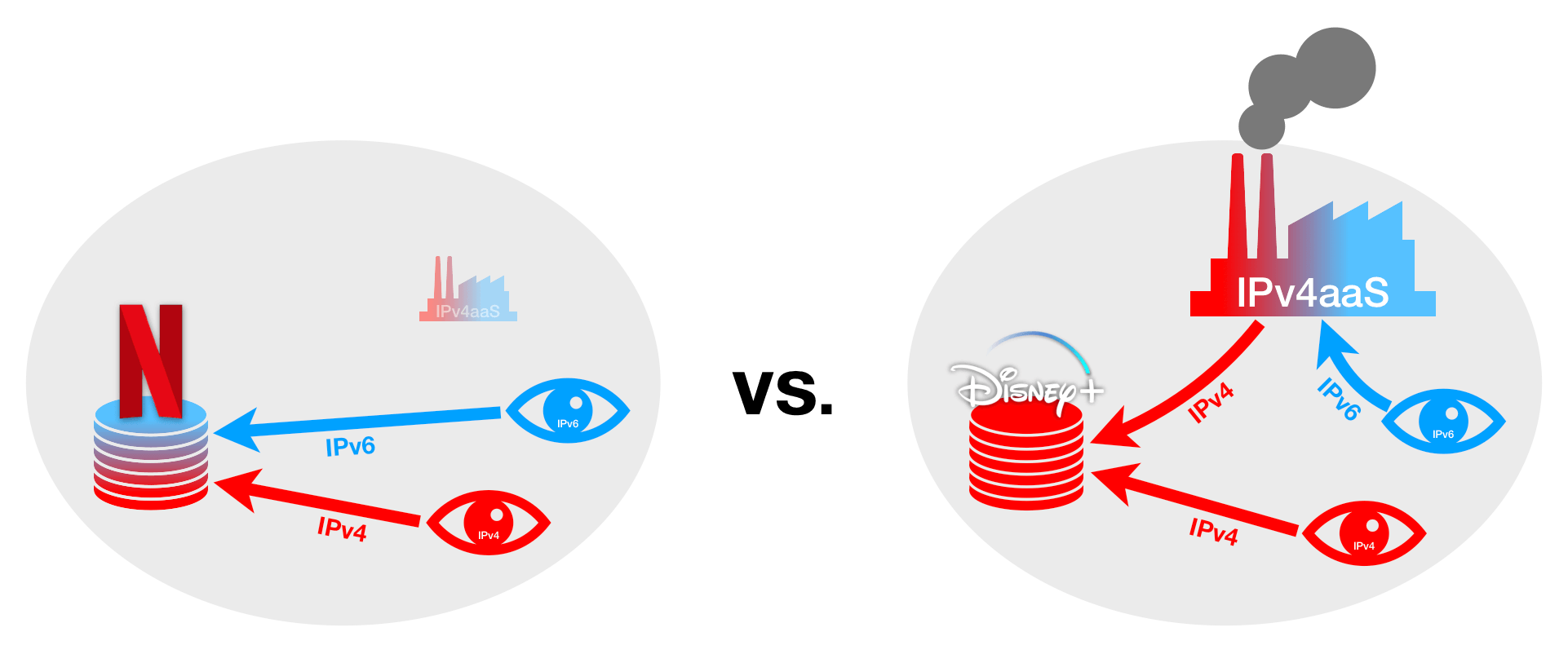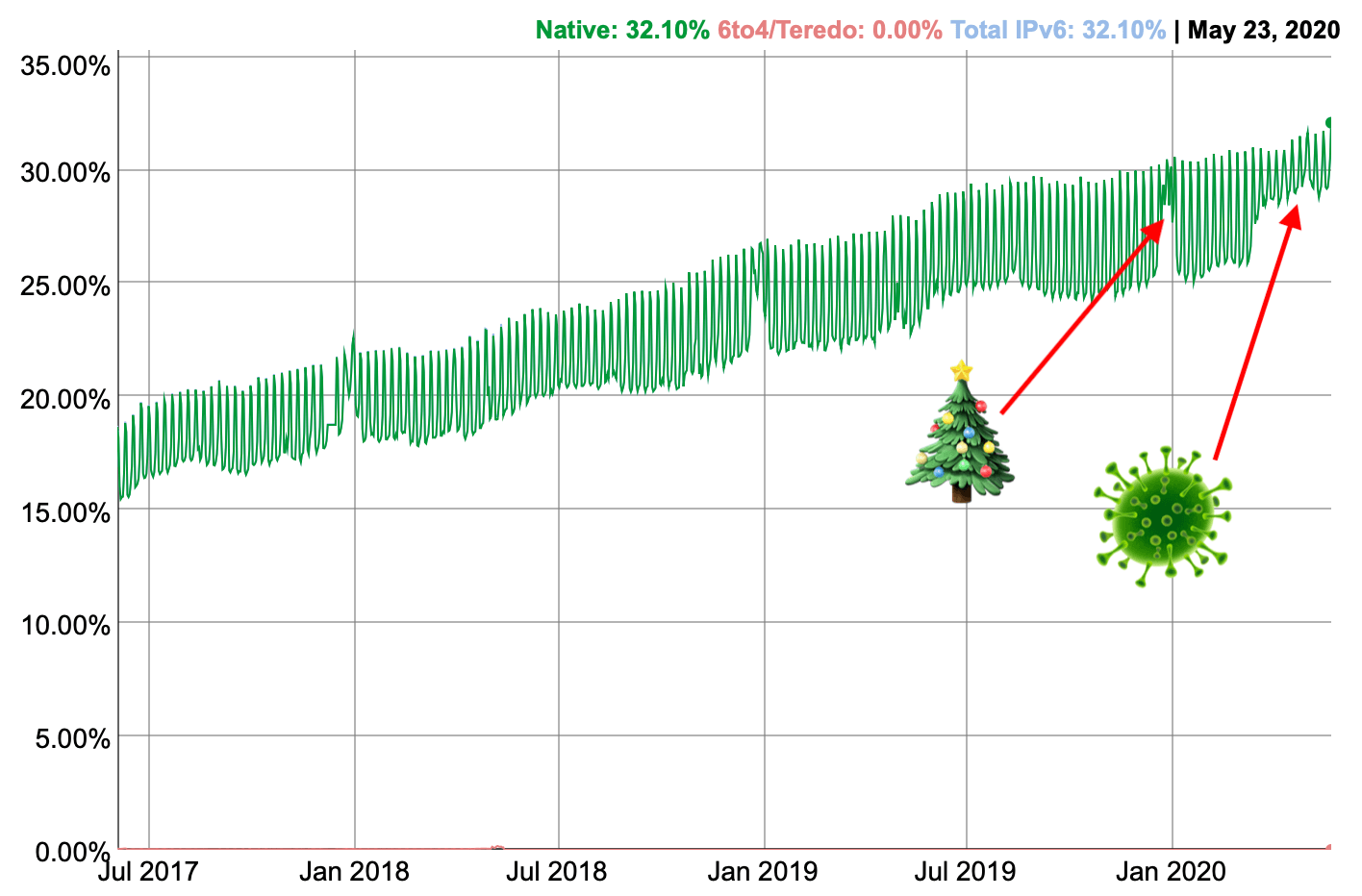
The 2010s were the decade that we ran out of IPv4 addresses and the decade that IPv6 deployment got underway—but IPv4 is still going strong even without a fresh supply of addresses.
Here's an overview of what happened with IPv4 and IPv6 in the 2010s.
Read the article - posted 2020-01-08
De jaren '10 van de 21e eeuw waren het decennium dat de IPv4-adressen opraakten en het decennium dat IPv6-adoptie op stoom begon te komen, maar IPv4 toont nog geen tekenen van omvallen zonder toevoer van verse adressen.
Hier is een overzicht van wat er gebeurd is met IPv4 en IPv6 in de jaren 2010.
Read the article - posted 2020-01-08
A few days ago I ran into this blog post from 2012: Deprecate, Deprecate, Deprecate, which lists a bunch of IPv6 stuff that's been "deprecated" by the IETF. That means: we changed our minds about this protocol or feature, stop using it.
Read the article - posted 2020-01-13
As of a few days ago, IPv4 has run out in all regions in the world, as AFRINIC, the Regional Internet Registry that serves Africa, has now reached IPv4 exhaustion phase 2.
For more on the IPv4 exhaustion over the last decade, see my story The rise of IPv6 and fall of IPv4 in the 2010s.
Read the article - posted 2020-01-16
Met ingang van een paar dagen geleden is IPv4 nu op in alle regio's van de wereld nu AFRINIC, de Regional Internet Registry die Afrika bedient, IPv4 exhaustion phase 2 bereikt heeft.
Zie mijn verhaal De opkomst van IPv6 en ondergang van IPv4 in de jaren 2010 voor meer over het opraken van IPv4 de afgelopen tien jaar.
Read the article - posted 2020-01-16
We moeten niet het succes van IPv6 afmeten aan in hoeverre IPv6 IPv4 vervangt, maar in hoeverre IPv6 IPv4 aanvult. En dat doet het al heel aardig op dit moment door IPv4aaS (IPv4 as a service) mogelijk te maken. En IPv4aaS zal ervoor zorgen dat ISPs IPv6 gaan eisen voor peering met streamingdiensten en andere grote contentaanbieders.

Read the article - posted 2020-01-23
We shouldn't gauge the success of IPv6 by looking at how much IPv6 replaces IPv4, but by how much IPv6 complements IPv4. And it's already doing that quite well today by making IPv4aaS (IPv4 as a service) possible. And IPv4aaS will make ISPs require IPv6 when peering with streaming services and other big content providers.

Read the article - posted 2020-01-23
Back in 2006, Bianca Ryan sang Why Couldn't It Be Christmas Every Day?
Turns out when it comes to IPv6 adoption, it is Christmas every day now:

Google's IPv6 statistics show that during the week, IPv6 adoption is about 5% lower than during the weekends, as apparently, more people have IPv6 at home than at work. Around Christmas, the minimum goes up while the maximum stays about the same.
In this regard the COVID-19 lockdown means it's Christmas every day: between December 20 and January 5, IPv6 adoption didn't drop below 27%. Between January 6 and March 13 there was no work day IPv6 adoption reached 28%, but since March 23, work day IPv6 adoption never dipped below 28%.
Permalink - posted 2020-05-25
Next Monday June 8, 2020, 8 years and 2 days after World IPv6 Launch, the RIPE NCC is organizing a RIPE NCC::Educa online education event about running IPv6-only.

Halfway through the morning (European time) I'll be talking about IPv6 address planning, based on my experiences with IPv6 numbering plans (see my publications).
At the end of the event, I'll be participating in a panel discussion with Nico Schottelius and Veronica McKillop titled "When can we turn off IPv4?"
Go to the RIPE website for more information and to sign up.
Read the article - posted 2020-06-02
These are my slides from my IPv6 address planning presentation at the online RIPE NCC::Educa IPv6-only event.
Permalink - posted 2020-06-08
Last week I recorded a remote guest lecture about IPv6 for the Computer Networks course at the Hochschule Augsburg with Rolf Winter. It's a 63 minute Youtube video, with mostly me talking about IPv6 and Rolf interjecting with questions now and then. Have a look over at Youtube.
And these are my slides.
Read the article - posted 2020-12-22